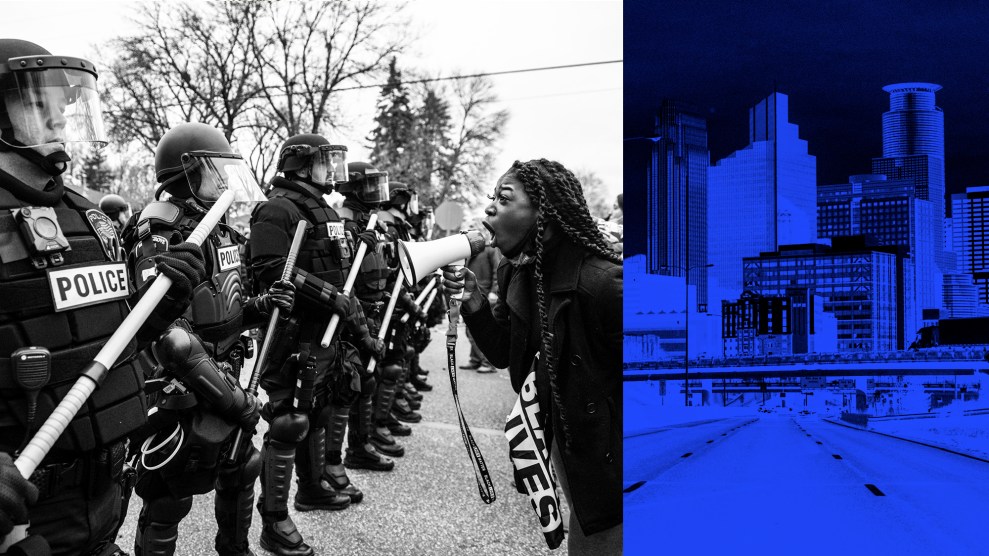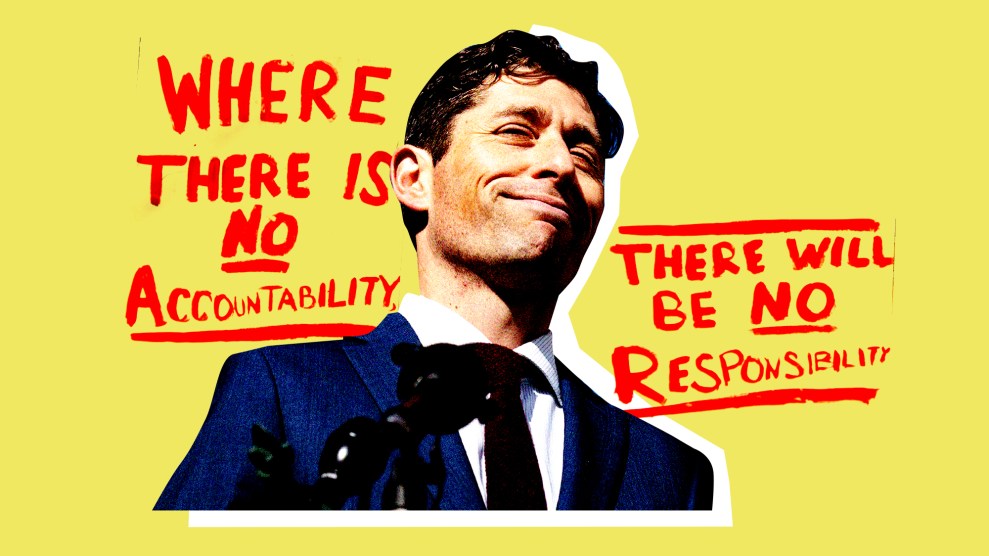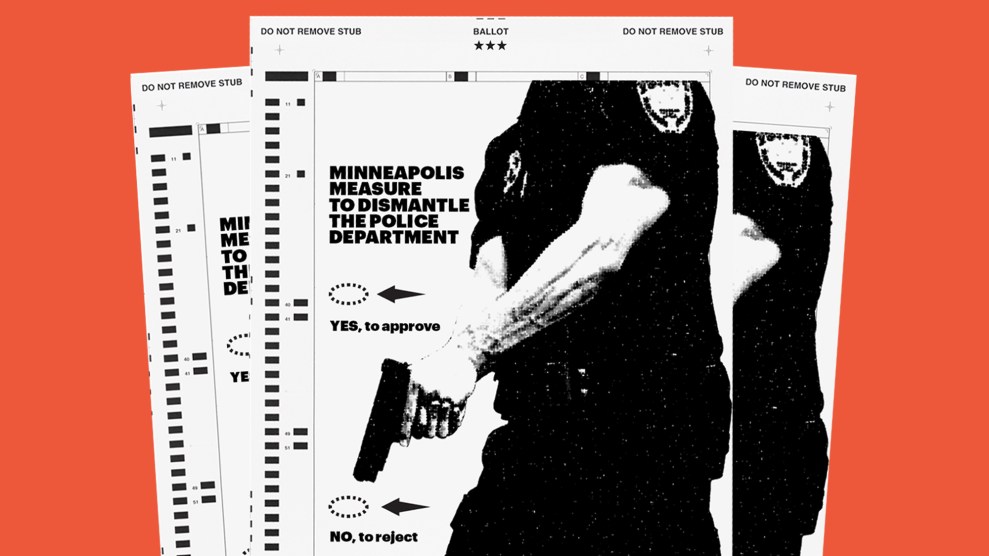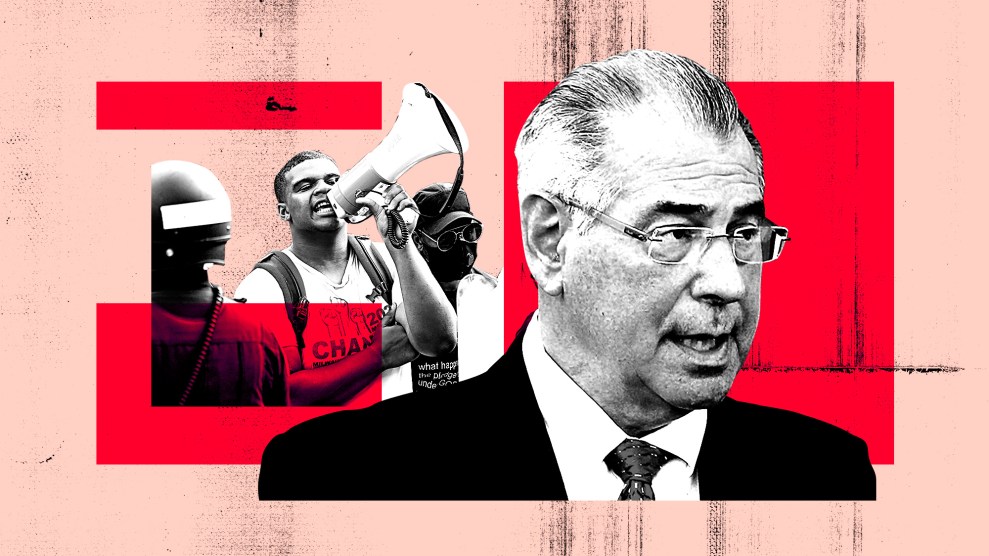This article is produced as a collaboration between Bolts and Mother Jones.
For the first time since the murder of George Floyd by police officer Derek Chauvin in May 2020, voters in Minneapolis and greater Hennepin County will vote for their new top prosecutor. County Attorney Michael Freeman, whose office came under intense scrutiny that summer over racial disparities and its handling of police brutality, announced last fall he was not seeking re-election. An August primary cut a crowded field down to two candidates: Mary Moriarty, the county’s former chief public defender who regularly clashed with Freeman during her tenure, and Martha Holton Dimick, a judge who used to work for Freeman’s predecessor, Senator Amy Klobuchar.
The candidates embody two sides of a debate that has divided Minneapolis and the nation since the summer of 2020. Moriarty is carrying the mantle of progressive criminal justice reform. Amidst a surge in homicides, Holton Dimick strives for a more traditional law and order agenda, and often seems outright hostile to the prospect of wielding the prosecutor’s office for the purpose of reform.
“A referendum on what we want to do as a community moving forward since George Floyd was murdered,” is how Malaika Eban, the Deputy Director at the Minneapolis-based Legal Rights Center, described the race for Hennepin County Attorney. “Even though this is a nonpartisan race, [the candidates] have been offering two really different perspectives on what to do in order to keep our community safe,” she added.
Floyd’s killing on a south Minneapolis street corner in 2020 sparked a historic nationwide outpouring of protest and debate over policing and racism in America. This call for a less punitive, less racist system of policing dovetailed with the aims of reform-minded prosecutors in cities around the US who have leveraged the discretion held within district attorney’s offices in an attempt to undo mass incarceration. But since 2020 reform critics have invoked the rise in violent crime around the country to push back, and they often use Minneapolis as an example in their arguments about how criminal justice reform has gone too far.
“A dangerous and dystopian ghost city, racked by gun violence,” wrote New York Times opinion columnist Thomas Friedman in 2021, describing post-Floyd Minneapolis. An August segment on Fox News featured Laura Ingraham interviewing two Minneapolis officers while the chyron onscreen read: “Two Years After Floyd Riots, Radical Leadership Leaves Minneapolis In Shambles.” This sentiment expressed by Friedman and Ingraham is supported with scant evidence, and works more as a critique of rhetoric rather than of any actual policy change, but a high-profile loss for the left in a 2021 referendum to dismantle the local police department has also fueled the sense of a local activist movement in retreat. Whether it’s bail reform, the movement to defund the police, or the recall of the progessive San Francisco District Attorney Chesa Boudin, criminal justice reform efforts have been demonized and spuriously connected to rises in crime.
And yet the continued structural problems among the Minneapolis police also persist. This past April, MPD was the subject of a scathing report from the State Department of Human Rights that found the department engages in a pattern of “discriminatory, race-based policing” and “emphasizes a paramilitary approach to policing that results in officers unnecessarily escalating encounters or using inappropriate levels of force.” The city and state are now in the midst of negotiating a state-level consent decree, with a second federal decree to follow when the U.S. Department of Justice finishes their investigation.
This combination of the aftermath of the 2020 protests, a police department in a legitimacy crisis, and a rise in violent crime have coalesced to make the upcoming prosecutor election a crossroads for Hennepin County.
The frontrunner in the race is Moriarty, a 31-year Hennepin County public defender, who finished first in the primary with 36% of the vote. As the county’s Chief Public Defender from 2014 to 2020, Moriarty played a key role in exposing racial disparities in traffic stops and undercover marijuana sting operations that Freeman’s office failed to act on. Moriarty was dismissed as Chief Public Defender in a controversial move by a state board in 2020, which set up an opportunity for her to run for the office she’d spent much of her career vociferously critiquing. Moriarty was spurred to run, she told me, because the “racial reckoning” in Minneapolis supposedly kicked off by the George Floyd protests of 2020 was morphing into a crime panic.
“I did see an opportunity for change slipping away,” she said. “And I thought, people who really value public safety, and a fair and just system need to step up during this time of turmoil and really present options that aren’t the same old things we’ve had for decades, which haven’t kept us safer.” Moriarty has emphasized a data-driven approach that would lessen the severity of punishment by investing more in diversion programs that promote alternatives to incarceration, and restorative justice programs.
“The difference with me is I know that people can be held accountable, and that doesn’t have to mean sending them to prison for years and years and years,” said Moriarty.
As a longtime critic of the abuses by the MPD, Moriarty plans to form a new police accountability unit within the prosecutor’s office. Moriarty told me that currently, the county attorney’s office reviews more police body camera video than police leadership does, which would allow her office to identify police misconduct when the department is unwilling to. As it stands, the majority of complaints against Minneapolis cops are kept hidden through a disciplinary loophole enacted by Mayor Jacob Frey and former Chief Medaria Arradondo in 2021 called “coaching,” which withholds police misconduct data from the public. (The ACLU filed a lawsuit against the MPD in 2021, stating that this practice violated public record laws).
Holding police accountable, “is the only way we’re actually going to be able to prosecute violent crime effectively, because that’s how you’re going to get good police work,” said Moriarty. Moriarty also says she would establish a publicly-accessible “do-not-call” list, following the lead of other reform candidates across the country; if a cop has proven to continually lie under oath, she plans to ban attorneys from calling them as witnesses, which would make it difficult for that officer to continue to interact with the public.
“Tough but fair,” is how the Minneapolis Star Tribune described Moriarty’s opponent Martha Holton Dimick, in their editorial board’s endorsement. Holton Dimick, a recently retired district court judge and former prosecutor who finished with 18% of the primary vote, has said she was compelled to run for office by Floyd’s murder. She also often mentions the gun violence of the last two years in north Minneapolis, where she has lived for decades.
Like Moriarty, Holton Dimick says she wants to expand court diversion programs and that for low-level offenders incarceration should be a “last resort.” But the central thrust of her campaign has been a direct, explicit and often pugnacious refutation of the city’s activist movement to dismantle the local police department. And despite a rise in outsiders like civil rights attorneys and public defenders taking over prosecutor offices, Holton Dimick has attacked Moriarty over her professional background, calling her a “disgraced former public defender” with an “opposite professional perspective,” who “has just worked with criminals” in debates and fundraising emails to her supporters.
According to Holton Dimick, the radical activists with plans to defund the police are responsible for the gun violence in her neighborhood. Holton Dimick frequently cites the defund movement as the primary culprit for the violence because of the coercive power of the “narrative” it supposedly produced. “[Defund] was basically giving the criminal element in our city and across the county, the go-ahead and commit crimes sign,” she told me in an interview. “The wrong narrative is out there. And we need to send a new narrative that says if you commit crime, there are consequences.”
Holton Dimick focuses on narrative effects, rather than pointing to actual budgetary effects, for a reason: 8 million dollars were shifted away from the MPD in 2021, but the department now has a higher budget than they did before George Floyd was murdered. Moreover, violent crime has risen across the nation, including in states, cities, and rural areas controlled by Republican governments and tough-on-crime prosecutors.
Minneapolis has been a surrogate for these national conflicts, and the starkly divergent visions of Holton Dimick and Moriarty map onto debates that have resonated more loudly since the summer of 2020. But while this is a fight that was heightened by the murder of George Floyd, it’s also one that goes deep into the history of policing and prosecution in Minneapolis. They themselves faced each other in the courtroom on at least one noteworthy occasion.
And more broadly, their stories reflect decades of local history that made Minneapolis the kind of place where protests like those in 2020 could set off.
When George Floyd was murdered, Mike Freeman was already on shaky ground with many in Minneapolis. In 2016, Freeman declined to charge two white cops named Dustin Schwarze and Mark Ringgenberg for shooting and killing a Black man named Jamar Clark. The decision came after Clark’s death had provoked a tense 18-day occupation of the 4th Police Precinct in north Minneapolis.
In the immediate days after Floyd’s murder, a group of Minnesota lawmakers urged in an open letter of that Minnesota Governor Tim Walz appoint Attorney General Keith Ellison to take over Chauvin’s prosecution, in part referencing the Clark decision. “[Mike] Freeman did a ton to erode trust with [communities of color in Minneapolis]. From the decisions made to over-prosecute folks for low level offenses, to the handling of George Floyd’s murder,” said Eban.
Freeman embodied status-quo policies around criminal justice. He was Hennepin County’s chief prosecutor from 1991 to 1998. He only stepped down to mount an ultimately unsuccessful run for governor. In 1998, now-U.S Senator Amy Klobuchar was elected on a platform that included “More Trials, More Convictions.” Freeman regained his office in 2006 when Klobuchar left for Washington and has held the position ever since.
The tenures of Freeman and Klobuchar reflect what the Fordham University law professor Jed Shugerman calls “the prosecutor politician.” Historically, prosecutor’s offices have been “a stepping stone to higher office,” across the country, which can lead to an increased punitiveness towards civilians, a closer alliance with police departments, and a tendency to privilege public opinion and political expediency above administering justice. Perhaps that is why this commitment to law and order excluded accountability for police officers. During Klobuchar’s tenure there were 29 civilian deaths at the hands of law enforcement. No police officers were charged.
Still, the tides of public opinion changed over the past decade, and as the police killings of Jamar Clark in Minneapolis and Philando Castile just outside St. Paul rocked the Twin Cities, the stark racial disparities in Hennepin County’s criminal legal system (and just about everything else) gained more attention. An ACLU study in 2015 found that Black and Indigenous residents of Minneapolis were more than eight times more likely to be arrested for low-level offenses than white residents, for instance.
And during the 2020 Democratic presidential primary, Klobuchar’s punitive record held back her ambitions. She faced the loudest questions over her handling of the case of Myon Burrell, which more than any exemplified the pitfalls of tough-on-crime politics.
In 2002, Klobuchar charged Burrell, a sixteen-year-old at the time, with the murder of an eleven-year old girl named Tyesha Edwards, after a stray bullet ripped through the walls of her family’s house and killed her while she was doing her homework. It was a highly-publicized tragedy, and Klobuchar would later promote her work prosecuting the case in a Senate campaign ad, in her book, and on the primary debate stage in 2019. It ultimately led to Burrell serving 18 years for a murder that the state had no hard evidence tying him to. He’d been sentenced to life in prison.
An Associated Press and American Public Media (APM) Reports investigation revealed that two witnesses placed Burrell at a convenience store called Cup Foods at the time of Edwards death. 18 years later, George Floyd would attempt to purchase cigarettes with a counterfeit twenty dollar bill from a clerk at the very same store before he was killed by Chauvin. Seven months after Floyd’s murder had brought Minneapolis into the national spotlight on matters of racism and the criminal legal system, Burrell’s sentence was commuted by the state pardons board. They said the case demonstrated a “failure to investigate that illustrates tunnel vision.”
In the mid-1990s, Minneapolis’ homicide rate was among the highest in the country, earning the unfortunate nickname “Murderapolis.” In 2021, the homicide rate tied the record set in 1995. (In 2022, homicides appear to be coming down.) Holton Dimick—who was hired as a prosecutor by Klobuchar in 1999—has drawn parallels between the two eras, touting her work in those years helping make Minneapolis safer. But she pushes aside that such an approach would mean more cases like Burrell’s.
When I asked if she had a reflection on what Burrell’s case could teach the city as it lives through another era of heightened gun violence, Holton Dimick demurred. She worked in a different division at the time and what she knew about Burrell’s case is what she’d read in news coverage, she said. “I know that that’s something that you all want to hear about, but you’re asking the wrong candidate,” said Holton Dimick.
That’s because as a free man, Burrell has spent some time over the last year with a new title: Mary Moriarty campaign staffer.
In our interview, Moriarty held up Burrell’s early support for her campaign as indicative of the type of change she would bring. “That somebody who had those things happen to him wanted to support my campaign because he believed that I would make the system better for everyone is really an honor,” said Moriarty, who worked as a public defender in Hennepin County at the time of Burrell’s prosecution, but was not involved with his case.
A rare look at the two candidate’s styles also came in 2002. Moriarty was assigned a client who was charged with three different prostitution-related offenses. A woman he believed was his girlfriend claimed that he was actually her pimp. In the initial trial, the man was acquitted on one of the charges. But he had to stand retrial on another. Like the first judge, the second judge said they’d exclude an expert witness because it was not relevant. The prosecutor then attempted to recharge the count that had already been acquitted with a third separate judge, and included a witness tampering charge that would’ve prevented Moriarty from continuing to represent her client.
In the end, all charges were dismissed against Moriarty’s client, and the judge harshly admonished the prosecutor in their closing statement, questioning whether they were intentionally trying to “deprive [Moriarty’s client] of his appointed counsel, Miss Moriarty,” and added that their conduct “makes it impossible for any other remedy to give meaning to the kinds of constitutional rights and protections that this court is sworn to uphold and preserve.”
The prosecutor on the case was Holton Dimick.
Several cases like this one—where Holton Dimick was reprimanded or had a decision overturned or reversed have been highlighted by People Over Prosecution, a political action committee that began as an attempt to recall Freeman in 2020 and is now supporting Moriarty.
Moriarty’s time as a public defender came to an end in controversial circumstances in 2020, when the Minnesota Board of Public Defense declined to extend her contract for another term in the Chief Public Defender position. It followed a suspension and a letter of reprimand for allegedly instituting a hostile work environment for her employees, and for wielding the media against her justice partners, like the County Attorney’s office. Moriarty said that the ouster was punishment for her racial justice advocacy, then sued and was awarded a $300,000 settlement. Just last month, rank-and-file public defenders in the county gave the head of the board, Bill Ward, a vote of no confidence; Ward endorsed Holton Dimick and is a donor to her campaign.
Cedrick Frazier, a Democratic lawmaker from the northwest suburbs of Minneapolis who has led police reform efforts in the Minnesota State House over the last year, has remained a Moriarty supporter through these events. Frazier was mulling a run of his own before he decided to endorse Moriarty, who he used to work alongside as a public defender.
Frazier recalled a story to me from early in his career, when Moriarty advised him to consider the “ripple effect” potential incarceration would have not only on his client, but on his client’s family and broader community. “That is exactly the kind of the thoughtfulness we need in the criminal justice system, when we’re talking about having someone that’s in a position that could maybe intercede or intercept and prevent some crimes from happening just by the way you handle cases as a prosecutor,” said Frazier.
These longstanding tensions over the shape of law enforcement in Minneapolis came to a head in 2021, when progressive activists and their allies on city council put a city charter amendment on the ballot. That amendment would have removed the minimum staffing requirements for police from the charter, moved its control from the mayor to the city council and refashioned it into a Department of Public Safety with a “comprehensive public health approach.”
Police officers would have kept their jobs, but the scope of their duties would have been gradually reduced. But because the amendment was supported by politicians and activists who had publicly committed to defunding and abolishing the police, the amendment known as “Question 2,” became a referendum on just that.
In November 2021, Question 2 lost 56-44 percent.
Holton Dimick has aligned herself with that result to win over the county this year. Moriarty told a reporter she won’t be sharing how she voted on the amendment. If a future police ballot question faced a legal challenge, she may have to recuse herself as county attorney, she’s said. Holton Dimick has criticized that decision as dishonest and she has made her own “no” vote a routine part of her stump speech.
“We can’t go about reforming a police department that doesn’t exist,” she said.
While Holton Dimick has said she’s committed to reforming the department, she also sought and earned an endorsement from the Minnesota Police and Peace Officers Association, whose legal fund paid for Derek Chauvin’s defense. Dimick doesn’t think it sends any mixed message.
“It really depends on who you want to ask. I don’t think so,” said Dimick.
I asked Paul Ostrow, a current prosecutor for a nearby suburban county and former Minneapolis city council member who ran in the primary against Dimick and Moriarty as a moderate, about the endorsement process.
Ostrow also sought the endorsement from the MPPOA, but was taken aback that the screening panel—which included the Police Officers Federation of Minneapolis—weren’t interested in his ten point plan to improve public safety. Instead, “they were almost exclusively questions about police prosecutions,” he told me. “It was really the only issue that was discussed at that screening.”
Ostrow is not endorsing in the general election but said that alliance could be of concern. “I don’t want to necessarily assume why they endorsed Martha,” he said. But “the [Minneapolis] Police Federation was a major voice in that screening. I think there’s reason to be concerned about that. We’re heading into a consent decree, and the last thing we need is to have a county attorney whose objectivity can be questioned.”
The political battle lines drawn by the “Question 2” referendum fight have continued into 2022. In the August primary, Rep. Ilhan Omar was nearly upset by primary challenger Don Samuels, a former city council member who was the leader of the opposition to Question 2.
Holton Dimick has received endorsements from Samuels and Minneapolis mayor Jacob Frey. Jacob Hill, Frey’s deputy campaign manager for his 2021 reelection, now manages Holton Dimick’s campaign. He was also a staff member on Samuels’ congressional campaign.
Moriarty is endorsed by Omar and Minnesota Attorney General Keith Ellison, the two most prominent politicians who supported Question 2, along with some of the same organizations who were part of the Question 2 coalition.
Holton Dimick has repeatedly stressed that this type of change is out of step with her neighbors in north Minneapolis, a predominantly Black part of Minneapolis that has suffered from both the rise in gun violence and routine abuse by the police. “Mary lives in Southwest MPLS. My community voted the same way I did last year by a large margin. Please stop speaking for us,” Holton Dimick wrote in a tweet earlier in the campaign.
But the wealthier, whiter wards in southwest Minneapolis also voted against Question 2 overwhelmingly, and were decisive in tanking the referendum. It’s these same neighborhoods where Holton Dimick had her best performances in the August primary, whereas Moriarty won every precinct in north Minneapolis.
For Eban from the Legal Rights Center, the debate around how Black people and other communities of color relate to law enforcement tends to oversimplify a complicated question. “[What the community is asking is] can you all do better? Can you all involve us in that process? Can you understand this tension that we have to hold every day of wanting to be safe and not trusting the people who are supposed to be keeping us safe?” said Eban. “I don’t think that that means that the community wants more of the same, that they’re asking for harsher punishments and more prosecution.”
In the summer of 2020, Moriarty saw a window for crime, policing, justice and punishment to be different than they had in Minneapolis for the first time in decades. How that call for change has been interpreted and put into political action in the two years since George Floyd’s murder however, has been anything but predictable.
“[In 2020] I thought, well, here’s the biggest opportunity [for change], because we’re not going back,” said Moriarty. “I think it remains to be seen where we’re going.”
An earlier version of this story misstated Jacob Hill’s position on the Jacob Frey campaign.















